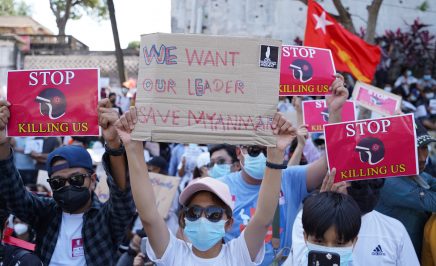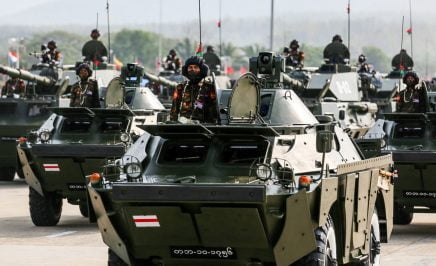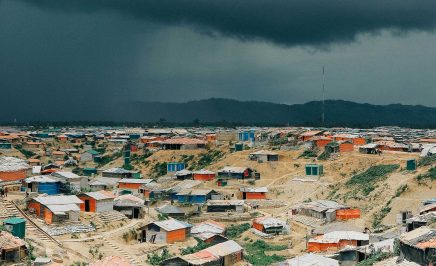Today marks the second anniversary since the Association of Southeast Asian Nations (ASEAN) agreed on the Five-Point Consensus in response to the military coup in Myanmar. The Myanmar military has ignored calls from the international community to stop the violence. Moreover, since the coup, the Myanmar military has committed war crimes and possible crimes against humanity.
ASEAN leaders must step up and address the situation in Myanmar without further delay. Amnesty International has assessed ASEAN’s Five-Point Consensus using concrete evidence as examples, and highlights its failures:
First, there shall be immediate cessation of violence in Myanmar and all parties shall exercise utmost restraint.
The Myanmar military authorities executed at least four people, sentenced at least 123 people to death, and arrested 21,334 people – with 17,446 people still detained, according to the Assistance Association for Political Prisoners (AAPP).
The security forces tortured detainees, killed at least 3,239 people, including unlawful attacks killing and injuring civilians through the use of deadly air strikes, extrajudicial executions, artillery shelling, banned landmines, and cluster munitions.
According to the United Nations Office for the Coordination of Humanitarian Affairs (OCHA), since the coup, the fighting has displaced 1.4 million people inside the country, burned or destroyed 60,000 civilian properties and pushed 75,400 people to seek refuge in neighbouring countries.
The military authorities have also detained and imprisoned at least 2,000 Rohingyas since the coup for ‘unauthorized travel’ outside of Rakhine State. These numbers illustrate the fact that the Myanmar military does not plan to cease violence or exercise restraint against civilians.
Second, constructive dialogue among all parties concerned shall commence to seek a peaceful solution in the interests of the people.
In July 2022, the Myanmar military executed four people, including an activist and one member of the National League for Democracy (NLD). As of December 2022, the Myanmar military sentenced Aung San Suu Kyi to 33 years in prison in grossly unfair trials, in completely untransparent procedures.
In October, Magway District Court sentenced ex-NLD parliamentarian Win Myint Hlaing to 148 years in prison on terror-related charges. Around the same time, activists Aung Khant, Kyaw Thet and Hnin Maung were sentenced to prison terms of between 95 and 225 years under the Counter-Terrorism Law.
The Myanmar military continues to target and imprison politicians from opposition groups. The Myanmar military authorities are using the justice system as an oppressive tool to silence and collectively punish any voice of dissent. On 7 April 2023, Reverend Samson, a Kachin religious and community leader, was sentenced to six years in prison on charges of unlawful association, defamation and terrorism. These charges are used as a tool by the Myanmar military to silence and punish people for exercising their freedom of speech. A constructive dialogue is not possible if people are unfairly imprisoned and arbitrarily detained. The Myanmar military must release all those detained and imprisoned for their peaceful opposition to the coup and to the military’s human rights violations.
Third, a special envoy of the ASEAN Chair shall facilitate mediation of the dialogue process, with the assistance of the Secretary General of ASEAN.
In March 2022, the ASEAN Special Envoy for Myanmar visited Myanmar for the first time. The Special Envoy met with Senior General Min Aung Hlaing, but the military reportedly denied him to meet with any civil society groups, or members of the NLD, which had won the most seats in the 2020 election. The Myanmar military also rejected the Special Envoy’s request to meet with Aung San Suu Kyi. This failure to meet with anyone other than the Myanmar military leadership shows that ASEAN has not been able to facilitate mediation.
Fourth, ASEAN shall provide humanitarian assistance through the AHA Centre.
In October 2022, the Myanmar military enacted the Organization Registration Law, severely restricting the right to freedom of association by imposing criminal penalties on national and international humanitarian organisations if they do not register with the authorities. The enactment severely impedes desperately needed humanitarian aid.
Amnesty International has documented the military authorities obstructing lifesaving humanitarian aid through cumbersome administrative restrictions and attacking camps for internally displaced people. Massive aerial bombing, indiscriminate shelling, and massacres by the military are causing large numbers of casualties and displacements – further increasing the need for humanitarian assistance.
UNOCHA estimates that a total of 17.6 million people, including more than nine million women and girls, would require humanitarian assistance in 2023. In December 2021, two humanitarian workers were among those killed in a massacre by the military in Kayah State. UNOCHA’s end-year report also indicates that “Myanmar recorded the second highest number of aid workers killed globally in 2022, and the fourth highest number of aid workers injured”. The AHA Centre has also failed to provide anywhere close to adequate humanitarian assistance to the population in need.
Fifth, the special envoy and delegation shall visit Myanmar to meet with all parties concerned. See points 2 and 3.
In response to ASEAN’s failure to implement the Five-Point Consensus, Amnesty International urges ASEAN and ASEAN member states to make the following recommendations to the Myanmar military:
1. Immediately stop dropping aerial bombs on civilians and carrying out indiscriminate attacks by ground and air in violation of international humanitarian law.
2. Lift internet blackouts, administrative and other arbitrary restrictions on humanitarian aid, stop attacks on humanitarian workers, and allow unimpeded access to national and international humanitarian organisations, so that they can reach all civilians in need.
3. Release all detainees arbitrarily detained or unjustly imprisoned through grossly unfair trials since the coup.
4. Immediately halt acts of intimidation, arrests, or torture and other ill-treatment of media workers, healthcare workers and others who peacefully joined the Civil Disobedience Movement.
5. Release all Rohingyas arbitrarily detained for exercising their right to freedom of movement and halt the military’s role in any plans to forcibly return Rohingyas from Cox’s Bazar and Bashan Char camps.





